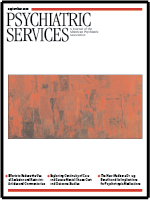Pharmacologic Response to Depressive Disorders Among Adolescents
Abstract
OBJECTIVES: The purpose of this study was to identify determinants of use of psychoactive medication and receipt of selective serotonin reuptake inhibitors (SSRIs) among adolescents with a diagnosis of new-onset depression. METHODS: A population-based retrospective cohort study was conducted among 447 adolescents enrolled in the Quebec drug plan who had new episodes of depression diagnosed between October 2000 and March 2001 by pediatricians, general practitioners, or psychiatrists. The main outcomes were use of psychoactive medication in the year after diagnosis and receipt of SSRIs at the first visit during which pharmacotherapy was prescribed. Receipt of SSRIs was assessed by the initial psychoactive dispensing claim following the diagnosis of depression. RESULTS: In the year after diagnosis, 258 adolescents (58 percent) received psychoactive medications, of whom 135 (52 percent) initially received SSRIs. Diagnosing pediatricians were the least likely to prescribe psychoactive medication. Patients of psychiatrists were less likely than those of primary care physicians to receive antidepressants for dysthymia or adjustment disorder accompanied by depressed mood (26 percent compared with 42 percent). Being female, having a diagnosing general practitioner or pediatrician, and having the same diagnosing and treating physician were associated with higher odds of receiving SSRIs. Being a welfare recipient and living in a rural area rather than an urban area were associated with lower odds. CONCLUSIONS: Adolescent males, those receiving welfare, and those living in rural areas were less likely to receive treatment that was recommended at the time of the study and thus may need special attention from mental health care providers.



